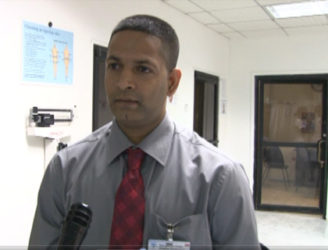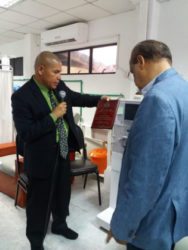The Nephrology Department of the Georgetown Public Hospital Corporation (GPHC) has been gifted eight dialysis machines from the Division of Nephrology and Hypertension of the University of Vermont’s Medical School to provide better care to patients with kidney disease.
The machines were handed over to the GPHC yesterday by Dr. J.R. Deep Ford, a former professor of the Vermont Medical School, a report from the Government Information Agency (GINA) stated.

Dialysis machines are used to treat patients diagnosed with stage five kidney disease, which is also known as an ‘end stage’ kidney disease.
Stage five kidney disease can be described as the condition where 80 to 90 percent of a person’s kidney is no longer functional, which causes a buildup of toxins in the body, resulting in those affected falling ill. The dialysis machine utilises a catheter, which is inserted either at the neck or at the groin area of the patient. The blood is filtered through the machine and restored to the body. The machine functions as a replacement for the kidney.
Currently, 25 patients are receiving Peritoneal Dialysis and 22 patients are receiving haemodialysis at the GPHC.
GINA noted that the department has two specialists in peritoneal dialysis and three registered nurses along with four nursing assistants administering haemodialysis.
“… These patients require approximately three to four sessions per week. With two to three functioning dialysis machines, we are unable to effectively dialyse all these patients on a weekly basis, so we have expanded the centre and with the contribution of more dialysis machines we will now be able effectively dialyse all patients admitted to the Georgetown Hospital,” head of the Nephrology Department Dr. Kishore Persaud, who is also a transplant surgeon, was quoted as saying.
Dr. Persaud pointed out that although the centre has seen new additions, there is now need for more staff to accommodate the growing number of patients who will seek treatment.

Minister of Public Health Dr. George Norton, who was present at the handing over of the machines, expressed gratitude for the donation.
He also used the occasion to stress the need for specialisation in the nephrology field. Norton advised that nurses and registered nurses should seek to further qualify themselves so as to have a greater number of specialists administering care to persons who have been diagnosed with end stage kidney disease.
“The GPHC Dialysis Centre continues to provide this life-saving procedure free of cost. However, there still exists a need to further build the capacity of the centre, and the Ministry of Public Health is committed to ensuring that this is done. We cannot do this alone, and therefore we are grateful for the support of the University of Vermont’s Medical School,” he stated.
At the end of July, GPHC’s Nephrology Department will begin to treat the targeted number of diagnosed staged five kidney disease patients, GINA said.
Two other dialysis machines were also handed over by the medical school to St. Joseph’s Mercy Hospital, the report noted.









